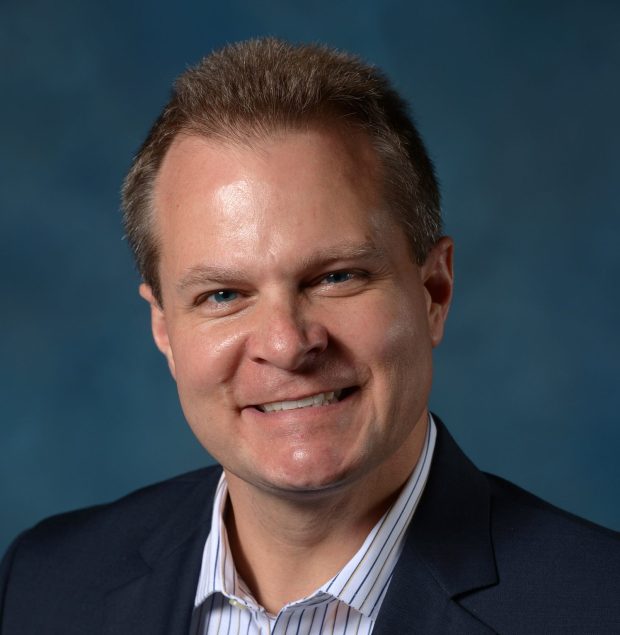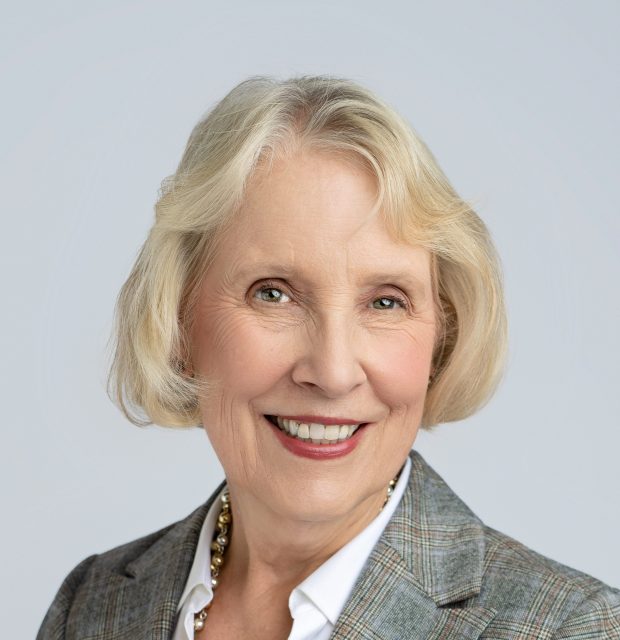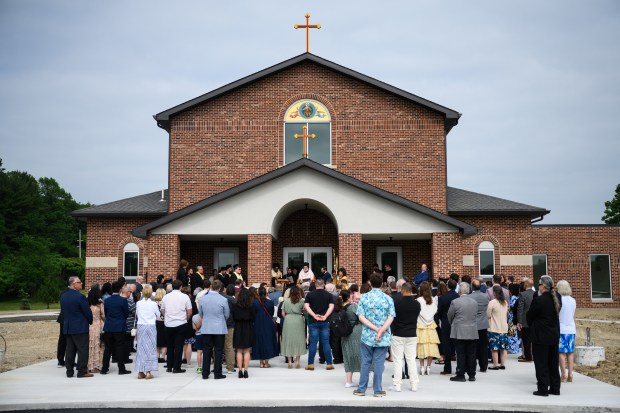In the upcoming Nov. 5 general election, Kane County voters will be asked to choose between Democratic incumbent Corinne Pierog and Republican challenger Lance Bell to hold the Kane County Board chair position.
The Kane County Board chair’s primary duty is to lead the County Board’s meetings. However, the board chair also often acts as a representative of the county to other communities and coordinates efforts across county departments.
Both candidates recently sat down with The Beacon-News to talk about their backgrounds, policy positions and visions for the future of Kane County.
Corinne Pierog, Democratic incumbent
Pierog has lived in the area for over 20 years, but before coming back to the Chicago area, where she was born, she also lived in California, New York, Georgia and North Carolina, she told The Beacon-News during a recent interview.
Among the wide variety of places Pierog worked during that time away from Illinois included public schools, colleges, a film company and a chamber of commerce in North Carolina, she said.
She also has a number of degrees, including a master’s in directing from San Francisco State University and an MBA from Roosevelt University, she said.
According to Pierog, it was when she moved back to Illinois that she first got into politics. She was elected to the St. Charles School District 303 Board of Education twice, and during that time she accomplished a number of things she said she was proud of.
For example, she said the board was able to keep taxes from being raised during the Great Recession, and it was her advocating that kept those taxes low, she said.
“The reason I say this is because people assume that I’m a ‘tax and spend’ liberal, which is absolutely not the case,” Pierog said.
During her time on the school board, she also advocated for early childhood education, especially to open up to all children a pre-K program that was previously restricted to certain children based on need, according to Pierog. A year after she left the board, the program was expanded as she had advocated for, she said.
After being on the St. Charles school board, Pierog was asked to run for state Senate, and she agreed. While she lost the race, Pierog said she learned a lot about politics during that time. While county politics are much different than state politics, the race gave her perspectives on networking, developing relationships and honesty within those relationships, she said.
Also during this time Pierog started her own business, called Sustainable Leadership Solutions, where she worked with different types of organizations to develop their boards, she said.
Then, in 2020, Pierog was elected to be Kane County Board chair. She first ran because she wanted to improve the culture of Kane County government, she said.
“When I first got there, there was silence in the hallways because everybody would stay behind their door and close it,” Pierog said. “It took six months, and then there was collaboration and laughter.”
Now that she’s been in office for four years, Pierog said that she “absolutely loves it.”
“Everything I’ve ever done is here,” she said.
One of Pierog’s proudest moments in office was also a moment of tragedy, she said.
While on a holiday trip just after Christmas in 2020, her husband suffered a brain aneurysm and died a month later. But, Pierog said she went back to work a week after.
“My son said, ‘Mom, people are counting on you, and you and Bob worked really hard on this. You’ve got to get back to work,’” she said.
By mid-March, the county had opened up a mass COVID-19 vaccination site with the help of the National Guard, according to Pierog. She said the site gave hundreds of thousands of vaccines during that time, and that the site also served as a training facility for the National Guard.
One of the other things Pierog said she was proud of during her time as chair has been the creation of the Kane County Economic Development Corporation, which is officially operational as of earlier this month. The organization is set to coordinate economic development efforts across the county, according to past reporting.
Other accomplishments Pierog said she was proud of include the naming of the Fox River Water Trail, the opening of the Longmeadow Parkway without a toll, the purchase of upgraded voting machines and the distribution of federal pandemic-era relief funds to building upkeep projects.
Pierog also helped work toward pay equity for the employees of Kane County government, which she counted as another accomplishment. Previously, people doing the same type of job in different departments were getting paid different salaries, which is no longer the case, she said.
But there is still work to be done to reach full pay equity, according to Pierog. She said that, if reelected, she would look at further ways of centralizing a county government that has been fragmented for a long time, which has caused inefficiencies, she said.
The county also needs a plan to guide its efforts, Pierog said.
“We cannot financially plan where we’re going in the county until we have that opportunity to talk to our communities, to our constituents, and talk amongst each other,” she said. “Because then when we start talking about the budget — which, everybody’s talking about the budget — we’ll know what our priorities are.”
The search has already begun for a firm to help the county develop a new strategic plan, its first in a long time, according to Pierog.
She said that, if reelected, she would make that plan front and center at each County Board meeting to keep on track with previously established goals.
Another issue facing Kane County is the use of reserve funds to balance the budget, which would be solved by the proposed sales tax that is set to go before voters in the April 2025 election, according to Pierog.
She said the county needs to start the strategic plan, get further along with the economic development corporation and get the voters’ decision on the sales tax so that work can start fixing the county’s budget before the County Board can start deciding how it wants to move into the future.
Pierog’s personal vision for the future of the county is an area of different land uses, from cities and towns along the Fox River to farms in the west.
While she wants economic growth within the county, she also wants to match that with supporting existing businesses and preserving land, she said.
Lance Bell, Republican challenger
Bell was born in Pittsburgh, Pennsylvania, but has lived coast to coast throughout his life, and he has made his way to the Chicago area twice in that time, he told The Beacon-News during a recent interview.
Ever since he was 12 years old, Bell has been an entrepreneur. He started a lawn mowing service at that age, built it up and then hired his friends as employees, he said.
At 16, he sold the business to another friend and started up a marketing business — a door mailer company — with a Macintosh he bought when they first came out in the mid-1980s, along with more of his friends as employees.
“I went around in a suit and was selling advertising to businesses in St. Louis as a 16-year-old kid,” he said. “I remember doing a presentation for National Supermarkets and all of the business owners in a strip.”
Bell then went off to college and received a degree from the University of Missouri in hotel and restaurant management before getting into the restaurant business, he said. It was Outback Steakhouse that brought him for the first time to the Chicago area, where he helped to open eight restaurants, he said.
He then helped to build a brewery called Flatlander’s Restaurant and Brewery in Lincolnshire in a new building that is still standing today, according to Bell. He said that the team raised over $5 million from private investors to start the restaurant.

After Bell got bought out from that restaurant, he went to open another larger restaurant and brewery in Washington, he said.
Throughout his time in the restaurant industry, Bell was learning the technology side of things, he said. With that knowledge, he opened his first technology company in Missouri in 1997, sold it, and then moved back to the Chicago area.
Again, he started a new technology company with the help of a friend, this time focused around point-of-sale technology for places that serve food, including restaurants but also senior living communities, which has been the primary focus of the business in recent years, he said.
His company, ServingIntel, processes over $50 million in sales annually, according to the company’s website. Bell said the company has over 500 clients throughout the United States and Canada.
In addition to his entrepreneurial efforts, Bell is also the author of two books, one about marriage and one about leadership, and leads a nonprofit called Christian Leadership Ministries, he said. That nonprofit does pre-marriage and marriage-in-crisis counseling in addition to supporting other ministries, such as Fox Valley Christian Action.
Now, Bell is continuing to keep up with ServingIntel and Christian Leadership Ministries while also pursuing politics, he said. He is currently the Kane County Republican Party’s vice chair of Data and Technology, where he is using a software called NationalBuilding to coordinate voter and volunteer efforts.
“We have, in the history of Kane County, the most effective field operation that’s ever been,” he said.
Although he is campaigning to be the Kane County Board chair, Bell said he has no intentions to become a career politician because they tend to get “corrupted” if they are a politician for too long. But, he is running in part because he sees issues with Kane County’s budget and taxes.
“I believe in what our founding fathers believed – that somebody leaves their business, they come into government, they serve for a short period of time and they go back to their world,” Bell said.
According to Bell, the county’s budget has grown considerably over the past few years, which he attributed mainly to hiring, and the county’s reserve funds are being used up. He also said he had a problem with the large difference between the raises union and non-union employees are getting.
“My primary goal if elected is fiscal restraint,” he said.
He hopes to keep costs down, potentially even lowering taxes, but improve community services through technology, including but not limited to AI tools, he said.
Bell said that using AI to make things more productive is a passion of his, and he has already implemented it throughout his company.
“I want to take the people there and make them two to three times more productive,” he said.
Another issue that Bell said is facing Kane County is a rise in undocumented immigrants. That is placing a burden on local governments and school districts, he said.
One of the programs Bell is proposing to address the issue is a voluntary free transportation program, which would help undocumented immigrants in the area get into Chicago or Cook County, where they can get more help than they can in Kane County, he said.
He is also proposing to create a task force made up of the Kane County sheriff and local police departments to “stay on top of people who aren’t supposed to be here,” he said. That task force would work with Kane County residents to create something like a countywide neighborhood watch, he said.
The other major issue Bell sees facing Kane County is a lack of intergovernmental transparency. Pierog sometimes does not involve the Kane County Board in what she is doing, he said, which has upset even other Democrat board members.
Bell’s personal vision for the future of Kane County is a government that collaborates with others, he said.
According to Bell, there has been a lack of coordination between local governments within Kane County, and he said that the county should be getting these governments and districts to better communicate with each other.
That collaboration should also extend to nonprofit organizations within Kane County, Bell said. If elected, he said he would help direct more resources to those dealing with mental health, like the Ecker Center for Behavioral Health and TriCity Family Services, who are already doing the work.
Bell would also look to do government collaborations with private industry to do things like create affordable housing, he said.
None of these programs should have an effect on the budget, according to Bell. If funds were needed, they would come from grants or other sources of raised money, like private individuals contributing to a cause, he said.
rsmith@chicagotribune.com





